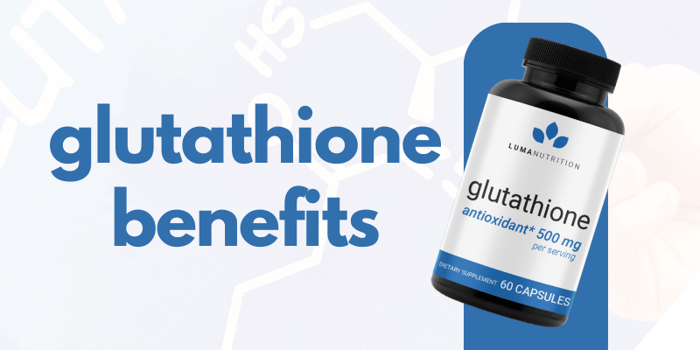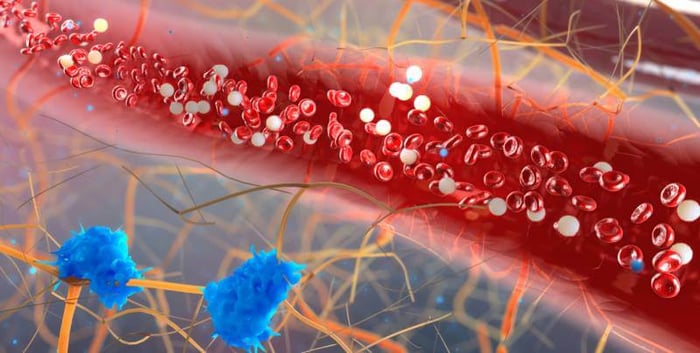

Glutathione Benefits
Glutathione is primarily known as the core ingredient in most whitening products. However, its list of benefits goes far beyond whitening products. In fact, glutathione is an essential component in the human body that provides multiple functions and benefits.
Primarily, glutathione is an antioxidant that the liver naturally produces. It’s also naturally occurring in many meats, vegetables, and fruits. Unfortunately, as the body grows old, glutathione production slows down. Poor nutrition, stress, and environmental toxins can also lower the body's glutathione levels.
To restore normal glutathione levels in the body, you can take glutathione supplements in the form of oral capsules, topical creams, inhalants, or intravenously. But what are the benefits of glutathione? And why do you want normal levels of it?
What Is Glutathione?
Glutathione (GSH) is a molecule derived from three amino acids: L-glutamate, glycine, and L-cysteine. Since it is an antioxidant, glutathione is heavily involved in metabolizing carcinogens and toxins, which also helps break down nutrients.
Glutathione Benefits and Uses
Glutathione is an important chemical in the human body. It helps the following functions:
●
Supporting the immune system and its functions
●
Developing DNA, which is a building block of cells and proteins
●
Forming and regenerating sperm cells
●
Helping other enzymes perform their functions
●
Breaking down free radicals and preventing oxidative stress
●
Regenerating vitamin E and vitamin C
●
Removing mercury from the brain
●
Assisting the gallbladder and the liver process fats
●
Assisting with apoptosis (normal cell death)
As an antioxidant, it is one of the chemicals in your body that can combat oxidative stress. Oxidative stress happens when there are too many free radicals in your body for the amount of antioxidants you consume and produce.
If you ignore oxidative stress, you can become more vulnerable to multiple diseases. Some of those are rheumatoid arthritis, diabetes, and cancer. Together with other antioxidants, glutathione can help you stop free radicals and raise your resistance against a variety of harmful and potentially life-threatening diseases.
Because of its ability to combat oxidative stress, your healthcare provider may give you glutathione shots to help you resist the poisonous effects of any harmful chemicals you are taking.
#1 Helps Slow Down Cancer Progression
Currently, glutathione can help with chemotherapy. Some doctors and researchers posit that it can help delay cancer progression as well.
However, be sure to consult your health care provider before taking glutathione supplements on your own, as in some cases, glutathione can also make tumors less sensitive to chemotherapy.
#2 Helps the Liver Recover From Damage
Oxidative stress can also exacerbate liver damage. Alcohol abuse, combined with oxidative stress, can result in fatty liver disease. Studies have shown that high doses of intravenous glutathione can help improve bilirubin, enzyme, and protein levels of people battling chronic fatty liver disease.
Other studies have shown that glutathione taken orally (300 mg per day for four months) helped improve the conditions of people suffering from nonalcoholic fatty liver disease. Aside from fatty liver disease, glutathione can also help in recovering from hepatitis.
#3 Improves Insulin Resistance
According to studies, low glutathione levels have been associated with slow fat burning and higher fat deposits.
As such, most glutathione manufacturers typically target diabetic individuals because of glutathione's positive effect on insulin resistance. Aside from helping diabetics lower their blood sugar, improving insulin resistance condition can also help better manage weight.
Glycine and cysteine supplements can help improve diabetics’ glutathione levels. Aside from helping with their sugar levels, it can also reduce oxidative stress.
#4 Helps With Autoimmune Disease
One of the significant adverse effects of autoimmune diseases is oxidative stress on the body. As we know, oxidative stress can contribute to rheumatoid arthritis, lupus, celiac disease, and a myriad of other health issues.
Most autoimmune diseases target mitochondria in certain cells. As an effective antioxidant, glutathione can reduce or stimulate the body's immune system and remove the free radicals from the mitochondria, eliminating one reason why the immune system may further attack mitochondria.
#5 Helps With Preventing Other Diseases
As oxidative stress can lead to numerous diseases, its number one enemy, glutathione, can help counteract those diseases. Aside from that, it has been discovered that some patients with various diseases often have low glutathione levels.
Some of the diseases that glutathione can help combat are:
●
Atherosclerosis
●
Alzheimer's disease
●
Lyme Disease
●
Chronic Fatigue Syndrome
●
High cholesterol
●
Asthma
●
Colitis
●
Glaucoma
●
Heart disease
●
Parkinson disease
#6 Helps With Skin Whitening
Most personal skin whitening products contain glutathione. However, while some people report seeing a noticeable difference, there is no scientific data to support that glutathione does indeed help with skin whitening.
Glutathione Sources
The best way you can find glutathione is in sulfur-rich foods. After all, one of the significant components of glutathione is cysteine, which is an amino acid containing sulfur molecules.
However, do note that pasteurization and cooking can diminish the amount of glutathione from your food. Some of the foods that contain this antioxidant are below:
●
Lean protein from rare or raw fish or chicken
●
Unpasteurized dairy, eggs, and whey
●
Cruciferous and allium vegetables and fruits
●
Herbs, nuts, and legumes
You can also increase your glutathione levels by increasing your vitamin C intake. Vitamin C is also an antioxidant, and it raises your glutathione levels indirectly by attacking free radicals first, which makes your body save up your glutathione for later.
Aside from diet and supplements, you can raise your levels by sleeping and exercising. Lack of sleep can lower your glutathione levels and cause other negative effects in your body. Exercise, on the other hand, is effective in maintaining high levels of antioxidants in your body.
Glutathione Side Effects and Risks
Receiving your glutathione from food is generally a safe way to consume glutathione. Taking supplements, however, may not be the best fit for everyone. You should consult your doctor before you take supplements. Some of the potential side effects that you might experience from glutathione supplements are below:
●
Bloating
●
Abdominal cramps
●
Allergic reactions
●
Bronchial constriction
Glutathione in a Nutshell
Many people within the medical community hail glutathione as the master antioxidant. As oxidative stress can cause and aggravate multiple health conditions, it is no wonder glutathione is considered a potential wonder drug.
However, there are still a lot of things we don’t know about it. The side effects of glutathione taken orally, topically, and intravenously are still being studied. Therefore, if you plan to self-medicate or take any products that contain glutathione, it is heavily advised that you talk with your doctor first.
Source:
[1]
http://www.immunehealthscience.com/glutathione-skin-whitening.html
[2]
https://www.webmd.com/vitamins/ai/ingredientmono-717/glutathione
[3]
https://www.medicalnewstoday.com/articles/323936#what-is-glutathione
[4]
https://www.healthline.com/health/oxidative-stress
[5]
https://www.verywellhealth.com/benefits-of-glutathione-89457
[6]
https://www.healthline.com/health/glutathione-benefits#glutathione-benefits



